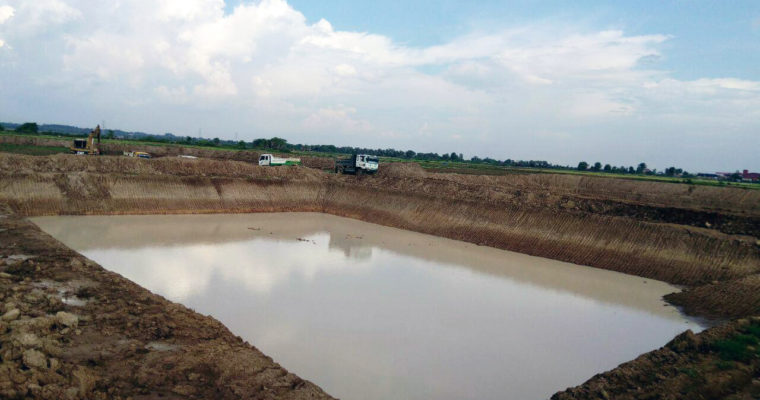Kampong Thom, Cambodia – Born from a farming family in Panha Chy Village, Tbaung Krampeu Commune, Santuk District, Kampong Thom, But Sovann graduated with a bachelor’s degree in agriculture from Prek Leap School in Phnom Penh. Wearing a smile as he looks at the dug fish ponds, he says, “We are sons of farmers so if we study other subjects, it may be hard for us to compete with others. Most children of farmers in this district don’t study agriculture but other technical skills such as accounting. I see this as an opportunity. We can invest in our community rather than working for others and earning merely USD 200 to 300 per month.”
With knowledge and skills passed on by his father and the learnings from his time spent at Prek Leap Agricultural School in Phnom Penh, Sovann started to invest in raising Pangasius Djambal Fish. He dug four fish ponds, each measuring 36 meters by 50 meters of which two are already rearing breed 80,000 fish.
Oeu Sophorn, Sovann’s father, received agricultural training from organizations and he was a former role model fish farming student. He only farmed at family-scale, but the income from the sale of fish ensured that he could sponsor the agricultural studies of his son. He says that among his four children, But Sovann is the only child showing an interest in this kind of farming. Even as a child, But Sovann wanted to learn about breeding, feeding, and feed production, as recalled by his father. This helped build a base for him. Now, after schooling, But Sovann has even new and better ideas for farming.
According to the analysis of Sovann, most Pangasius Djambal Fish are imported from Vietnam and, during certain months, it is hard to find such fish for sale. Spotting this gap in the market, he decided to dig a fish pond on a large scale. Previously, he failed in fish farming due to his limited experience, lacking a full understanding of the market, not knowing the fluctuating prices of fish and the inability to analyze and manage income and expenses. These lessons encouraged him to do comprehensive studies prior to this second fish farming investment.
Despite his past failure, his father is not reluctant to support his son emotionally and financially. For this second investment, he says, “I am willing to invest in my son’s fish farming. This time there is no pressure from me on him. He wants to do it and he thinks he can do it based on his skills and knowledge. I will not put any blame on him should he fail again. I am just glad to see him stand back up again. It’s a life lesson on the pathway to success.”
Though the success of But Sovann is in the future, this young farmer’s son has a strong belief in this fish farming investment. He is committed to making the best effort to achieve success in large-scale fish farming to pave the way to supply Pangasius Djambal Fish to Siem Reap, which is his first major market.
But Sovann is among the many young farmers that benefited from the AFOSP-MTCP2 Programme in Cambodia. #
About MTCP2
The Medium-Term Cooperation Program Phase 2 (MTCP2), a five-year capacity building program supported by the International Fund for Agricultural Development (IFAD), the Swiss Agency for Development and Cooperation (SDC), and the European Union (EU) , has been implemented in 22 countries across three sub-regions—Southeast Asia (through the ASEAN Farmer Organization Support Program-AFOSP-MTCP2), South Asia, and the Pacific—engaging 86 national federations of farmers organizations with 1,628 sub-national farmers organizations (FOs) with a total membership of around 43.5 million small-scale women, men and young farmers. The funding support (12 million USD) served as a catalytic fund that allowed FOs to enhance their capacity to engage in policy dialogues and to be effective channels of economic services to farmers. The program has contributed to the formation of strong national platform of FOs with improved capacity to engage in constructive policy processes and mobilize resources from mainstream agricultural development programs like extension services, credit, and pre and post-harvest facilities. The program also helped in re-structuring farmers’ associations into community-based social enterprises or as commodity-based cooperatives as well as consolidating FOs into agricultural cooperative federations/union to strengthen the role of small-scale farmers within an inclusive and sustainable value-chain. The program is being implemented by the consortium Asian Farmers’ Association for Sustainable Rural Development (AFA) and La Via Campesina (LVC).




Comments are closed